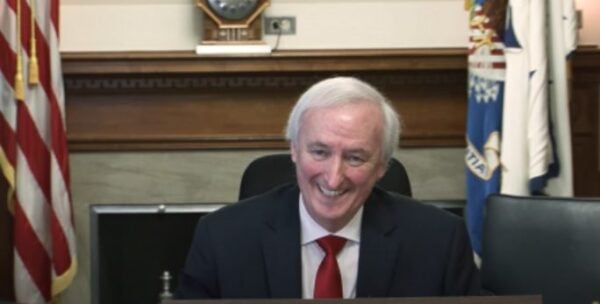
Jeff Rosen may be the right man for the times. We can only hope.
Today President Trump announced that Attorney General Bill Barr would be resigning before Christmas and Deputy Attorney General Jeff Rosen would be taking over:
…Deputy Attorney General Jeff Rosen, an outstanding person, will become Acting Attorney General. Highly respected Richard Donoghue will be taking over the duties of Deputy Attorney General. Thank you to all! pic.twitter.com/V5sqOJT9PM
— Donald J. Trump (@realDonaldTrump) December 14, 2020
According to Ron at CodeMonkeyZ on Twitter, Deputy Attorney General Jeff Rosen who is taking over for AG Barr has written about foreign intervention on US elections:
Soon-to-be AG Rosen recently wrote an essay on foreign influence in US elections.
“foreign actors are covertly trying to undermine confidence in our elections”
“malign foreign influence efforts in our elections has been a perennial problem“https://t.co/gPIPUk7pMp
— Ron (@CodeMonkeyZ) December 15, 2020
In his recent essay from late August of this year, Rosen shares the following:
But interference with infrastructure is not our only concern. We are also concerned about another threat, known as malign foreign influence. The key word is “influence.” Much of the time that is disguised propaganda. Other times, it is using pressure tactics on influential people. It can also take the form of hacking and disclosing private emails or phone messages. It comes in many different forms, all designed to influence how Americans think about issues and cast their votes. There are good lists of these on the FBI and ODNI websites…
…we are concerned when those preferences manifest themselves through malign foreign influence activities that are coercive, covert, or corrupt, whether the aim is specifically to influence our elections, or to influence policymaking and public discourse more broadly.
Rosen first discusses coercive activities and then discusses covert activities by foreign agents where he gives this example:
After World War II, the Cold War produced a whole new set of challenges from malign foreign influence. The Soviet Union employed covert or deceptive tactics as part of its so-called “active measures,” a phrase it used to describe malign influence activities like disseminating forgeries, disinformation, and propaganda and sponsoring front publications to undermine American interests. Most active measures were directed abroad, such as when, just a few weeks before the 1984 Olympics in Los Angeles, the KGB mailed athletes from Africa forged letters supposedly from the Ku Klux Klan with threats against them, or when the Soviets published stories in dozens of Soviet-controlled publications around the world claiming that the AIDS epidemic was started by U.S. military experiments. But the Soviets also used active measures to undermine public confidence or influence public opinion in the United States, including covertly forging documents and funding conspiracy-mongering books that supposedly tied the FBI and CIA to President Kennedy’s assassination or tied FBI Director J. Edgar Hoover to the Ku Klux Klan.
After discussing corrupt activities Rosen shared this story:
Historically, malign influence operations were often limited by their reliance on third parties, such as mainstream news outlets or popular magazines, to reach sizeable segments of the American public. For much of our history, the media were cautious about being used in this way. For example, many American journalists wrote exposés about Nazi propaganda in the United States and, at least by 1940, the press was largely “immune” to it. Decades later, the FBI told Congress in 1986 that “[t]he American media is sophisticated, and generally recognizes Soviet influence attempts.” But today, the media environment is considerably different, and the internet and social media also allow foreign actors to reach unprecedented numbers of Americans covertly, inexpensively, and directly, without ever setting foot on U.S. soil. We are all now familiar with the findings that, in the 2016 election cycle, the Russian Internet Research Agency “spent a total of about $100,000 over two years on advertisements” on Facebook to promote social discord and division, and similarly placed disguised posts and tweets on several social media platforms.
This of course is unfortunate how Rosen described it, because the advertisements were basically a bust and mostly after the election of 2016 on Facebook. The Mueller team indicted some Russians and a Russian company based on this tale and the Concord Management case was eventually ended by the DOJ. But at least there is recognition on Rosen’s part of foreign influence on our elections using Big Tech companies.
Overall, the essay does provide a picture of Rosen. He speaks highly of the DOJ and FBI and it would be unrealistic to think he would be harsh on these departments in this setting. But he didn’t provide a full understanding of the real risks with voting machines, for example, that would provide more comfort in his recent promotion to Acting AG.
President Trump re-tweeted this:
Soon-to-be AG Rosen recently wrote an essay on foreign influence in US elections.
“foreign actors are covertly trying to undermine confidence in our elections”
“malign foreign influence efforts in our elections has been a perennial problem“https://t.co/gPIPUk7pMp
— Ron (@CodeMonkeyZ) December 15, 2020